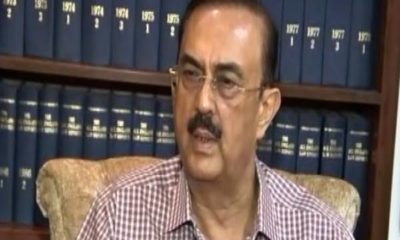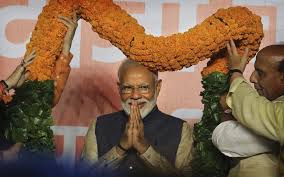Feature
Manmohan in coal case: Court rejects CBI closure report

New Delhi: A special court established last year to specifically try the cases relating to the allocation of coal blocks has rejected closure reports filed by the CBI in six of cases, including one against former prime minister Manmohan Singh.
The apex court had on July 18, 2014 set up a Central Bureau of Investigation (CBI) special court to try, on a day-to-day basis, cases arising from the allocation of coal blocks.
The CBI, which filed its first charge sheet in the matter on March 10, 2014, had filed investigation reports in 15 cases. Of these, the agency filed charge-sheets in nine cases and closure reports in six cases.
The court was not satisfied with the CBI’s closure reports in five of the cases, and asked the agency to conduct a further probe. Among the five cases was one related to a coal block allocation to Hindalco, in which Manmohan Singh was summoned, as were industrialist Kumar Mangalam Birla, former coal secretary P.C. Parakh, among others. The case related to allocation of the Talabira II coal block in Odisha to Hindalco in 2005. This order was passed on March 11, 2015.
On April 1, the Supreme Court stayed the summons against Manmohan Singh. On the court’s orders, the CBI followed up on probe in the five cases. Of the five, the court took cognizance of four cases, including Hindalco.
Additional Sessions Judge Bharat Parashar issued summons to various top leaders, government officials as well as corporate honchos, named in the cases. Among the cases is one related to allocation of the Moira and Madhujore (north and south) coal blocks in West Bengal to Kolkata-based Vikash Metal and Power Limited (VMPL). The case is still being probed.
The sixth closure report was regarding coal block allocation involving Prakash Industries Ltd. The court is yet to take cognizance in the case. Of the charge sheets filed in in nine cases, the CBI named various top government officials, including former minister of state for coal Dasari Narayan Rao, former coal secretary H.C. Gupta, former parliamentarian and industrialist Naveen Jindal, former Jharkhand chief minister Madhu Koda and Rajya Sabha MP Vijay Darda.
Judge Parashar was not satisfied with three of the charge sheets and observed that the probe agency has not conducted proper probe in finding out alleged collusion between public servants and company officials.
The court therefore ordered further probe in the three cases after taking cognisance of the charge sheets. The three cases relate to allocation of coal blocks in Rampia and Dip Side of Rampia in Odisha to Navbharat Power Pvt Ltd, Maharashtra’s Bander coal block allocation to AMR Iron and Steel Private Ltd, and Lohara (east) coal block in Maharashtra to Grace Industries Ltd.
Later, based on the report of further investigation, the court issued summons to former coal ministry officials K.S. Kropha and K.C. Samria and the companies mentioned and their heads.
In one of the matters, charge sheet was filed related to allocation of coal blocks to Vini Iron and Steel Udyog Ltd. in Jharkhand’s Rajhara town. The special court on September 4 last year returned the charge sheet filed by the CBI after the agency failed to respond adequately to the queries raised by the judge.
Later, in December 2014, the CBI filed a fresh charge sheet naming Madhu Koda and others as accused.
The CBI till April 1 this year has registered 40 first information reports in its ongoing probe into the coal block allocation cases. The Supreme Court on September 24, 2014 cancelled 214 coal blocks allocated from 1993 to 2011.
Senior counsel R.S. Cheema is the special public prosecutor. Special judge Parashar began his daily proceedings on August 25 last year after all cases related to coal matter were transferred to his court.
Entertainment
Meghalaya Reserves Legalized Gambling and Sports Betting for Tourists

The State Scores Extra High on Gaming-Friendly Industry Index
Meghalaya scored 92.85 out of 100 possible points in a Gaming Industry Index and proved to be India’s most gaming-friendly state following its recent profound legislation changes over the field allowing land-based and online gaming, including games of chance, under a licensing regime.
The index by the UK India Business Council (UKIBC) uses a scale of 0 to 100 to measure the level of legalisation on gambling and betting achieved by a state based on the scores over a set of seven different games – lottery, horse racing, betting on sports, poker, rummy, casino and fantasy sports
Starting from February last year, Meghalaya became the third state in India’s northeast to legalise gambling and betting after Sikkim and Nagaland. After consultations with the UKIBC, the state proceeded with the adoption of the Meghalaya Regulation of Gaming Act, 2021 and the nullification of the Meghalaya Prevention of Gambling Act, 1970. Subsequently in December, the Meghalaya Regulation of Gaming Rules, 2021 were notified and came into force.
All for the Tourists
The move to legalise and license various forms of offline and online betting and gambling in Meghalaya is aimed at boosting tourism and creating jobs, and altogether raising taxation revenues for the northeastern state. At the same time, the opportunities to bet and gamble legally will be reserved only for tourists and visitors.
“We came out with a Gaming Act and subsequently framed the Regulation of Gaming Rules, 2021. The government will accordingly issue licenses to operate games of skill and chance, both online and offline,” said James P. K. Sangma, Meghalaya State Law and Taxation Minister speaking in the capital city of Shillong. “But the legalized gambling and gaming will only be for tourists and not residents of Meghalaya,” he continued.
To be allowed to play, tourists and people visiting the state for work or business purposes will have to prove their non-resident status by presenting appropriate documents, in a process similar to a bank KYC (Know Your Customer) procedure.
Meghalaya Reaches Out to a Vast Market
With 140 millions of people in India estimated to bet regularly on sports, and a total of 370 million desi bettors around prominent sporting events, as per data from one of the latest reports by Esse N Videri, Meghalaya is set to reach out and take a piece of a vast market.
Estimates on the financial value of India’s sports betting market, combined across all types of offline channels and online sports and cricket predictions and betting platforms, speak about amounts between $130 and $150 billion (roughly between ₹9.7 and ₹11.5 lakh crore).
Andhra Pradesh, Telangana and Delhi are shown to deliver the highest number of bettors and Meghalaya can count on substantial tourists flow from their betting circles. The sports betting communities of Karnataka, Maharashtra, Uttar Pradesh and Haryana are also not to be underestimated.
Among the sports, cricket is most popular, registering 68 percent of the total bet count analyzed by Esse N Videri. Football takes second position with 11 percent of the bets, followed by betting on FIFA at 7 percent and on eCricket at 5 percent. The last position in the Top 5 of popular sports for betting in India is taken by tennis with 3 percent of the bet count.
Local Citizens will Still have Their Teer Betting
Meghalaya residents will still be permitted to participate in teer betting over arrow-shooting results. Teer is a traditional method of gambling, somewhat similar to a lottery draw, and held under the rules of the Meghalaya Regulation of the Game of Arrow Shooting and the Sale of Teer Tickets Act, 2018.
Teer includes bettors wagering on the number of arrows that reach the target which is placed about 50 meters away from a team of 20 archers positioned in a semicircle.
The archers shoot volleys of arrows at the target for ten minutes, and players place their bets choosing a number between 0 and 99 trying to guess the last two digits of the number of arrows that successfully pierce the target.
If, for example, the number of hits is 256, anyone who has bet on 56 wins an amount eight times bigger than their wager.























